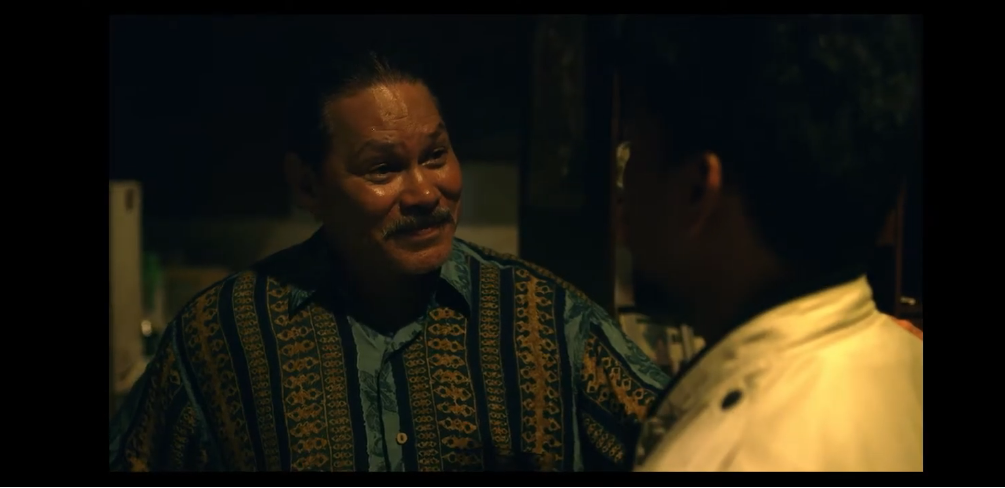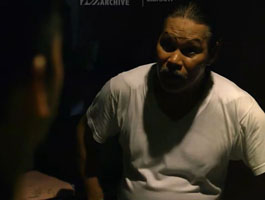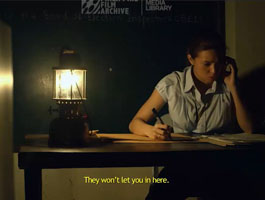Badil
Acting as a window into how flawed our basic political right has become, the film follows Nonoy as he takes over his Father, the Kapitans, duties as guardian to committed voters harassed by vote buyers on the eve of the election
PFA provides access for viewing of films with the approval or permission from the copyright owner(s) and those that are part of public domain. Access for viewing is also allowed to films in accordance with the statutory fair use of the government in accordance with law. To also safe guard and prolong the longevity of the material, PFA only allows these particular films to be viewed within PFA premises with compliance with guidelines in accessing and viewing these materials in the media library.
Reviews
Comments
Badil is a very small story set in a very small place. It takes place in a tiny barangay in Samar on the eve of an election. The elderly Ponso (Dick Israel) is a veteran campaigner for incumbent Mayor del Mundo. He gets to work on that day, walking around town, handing out money to people who promise to vote for his candidate. He takes his son Lando (Jhong Hilario) with him, giving him an education on how things are supposed to be done. When Ponso falls ill later that day, Lando has to take up his responsibilities. Word comes in that the opposition candidate might be bringing in a huge sum of money into the town to buy out people already loyal to del Mundo. Lando is made to keep watch over their voters, making sure that nobody can give them a better offer.
These are sinister dealings, with dangerous consequences. But the film takes pains to make it look like the most natural thing in the world. Because that’s exactly what it is. This is business as usual, a functioning economy that has been in place for years. People are expecting their payouts, making plans based on the sums that they know they’re going to be receiving from candidates. The majority of payoffs are done in broad daylight as Ponso takes his morning constitutional. It is a reality as mundane as buying soft drinks at the nearby carinderia.
The story then becomes about Lando, who never really seems sure that he wants to be part of all this. But his father assures him that this will be good for him, that the mayor will appreciate his efforts, and that he will be repaid in the future. Jhong Hilario lets the character’s trepidation show in almost every scene, Lando seemingly driven more by inertia than anything else. He may not want to be part of this, but he already is, and there’s nothing else to be done.
This is what the film really sets about depicting: a passive trap, a people so accepting of the way things are done that there isn’t actually anything to be done. Paying off people is fair play, and is carried out in even the brightest of settings. The only real offense is trying to buy off people that have already been bought off. And so that takes place in the dark of night, often with guns at the ready to scare off whoever might try to perpetrate this heinous act. But even deep in the shadows, long after the lights have gone out in the town, the process remains the same. Money is handed out with a smile on one’s face and a friendly lilt in one’s voice. This may be politics, but it’s personal, too.
The film never separates the politics from the personal. As Lando goes about his duties, he drags his ne’er-do-well brother along, paradoxically trying to make his less of a screw-up by involving him in the business of buying votes. Lando’s girlfriend is the daughter of a campaigner for the opposition, and she works as an election inspector. And though one would assume that this would be a point of contention, the film plays this out as if it were the most natural thing in the world. They are all part of the same system, after all.
Badil is remarkable in how it blends the sinister and the mundane. It depicts a system so broken that there is no separating the normal flow of life and the deep corruption that has penetrated it. One might scream and cry at whatever terrible thing the people atop this evil pyramid have done, but the screaming is tinged with acceptance. What can be done, after all? It’s a terribly cynical film, unable to find any source of hope within its milieu, no paragon of virtue to represent any way out of this morass. It can only point to what people can’t do: sit down, have a cup of coffee, and accept that it’s just the way things are. - Philbert Ortiz Dy (Sept 13, 2013)
Source: https://web.archive.org/web/20130919122909/http://www.clickthecity.com:…
“Bad-ass” That one word says it all. Badil means “Dynamite Fishing” in Waray. That pretty says what the characters mean when they say “pagdidinamita”.
If you read a lot of my past reviews, you probably know that I have a weakness to Grand Theft Auto-like films where the protagonist must travel to different places and accept missions from crooks to earn respect or money. Usually the main dude has his certain code but our protagonist in here is just starting in the ladder and is still indecisive whether he wants to be a part of it or not. It’s a coming-of-age film about a man who must choose to accept or deny the cynical traditional politics within his small barangay, to pay gratitude or not to those who’ve helped him in the past. When I say small, it’s degradinglu small. I have some problems with its cinematography. I felt dizzy in some shaky almost slow-mo (I don’t know what to call it) shots. The musical score is the best. Who ever knew that buying pancit cantons at a small grocery store can be that exhilarating? There’s this one shampoo commercial-like scene that kinda slowed the last act, for me. Most Chito Roño films examine Filipino traits and beliefs. Most are also horror. This is also a horror film disguised as a suspense action flick, for me. Chito always fails at the end of his films, for me, but the screenplay from Rody Vera made it hauntingly beautiful. It will punch you like a hard coffee if you caught the metaphors in the end. We all know that vote buying is abundant in this country. The film is brave in detailing every behind-the-scenes and showing the gritty election eve we have. It’s the first time that I’ve heard of the Bureau Election Inspection (BEI).
It’s been almost a decade since I saw Jhong Hilario (Lando) act this great. Most people praised Dick Israel (Ponso) for his performance, and he truly deserves that, but Jhong carried the entire movie with his emotions and gestures. Dick Israel also gave a performance of his life. That first scene with his man boobs and finger cracking showed how a bad motherfucker he is. The last scene gave me some Godfather chills. Nikki Gil (Jen) was also good. She looked better without the make-up. Their relationship is a tragedy in the making. Mercedes Cabral’s role is predictable but her scene with Lando was so painful. I can almost feel those violent kicks in the theatre. Yayo Aguila and Ronnie Quizon did well for an ungrateful couple. That indelible ink scene was far scarier than in most horror movies today. You just can’t trust Mon Confiado (Emil) and Archie Adamos from the moment they entered the screen. I didn’t get the name of the younger brother but he was okay. I commend Tonton Gutierrez (Del Mundo) for lending his face. You won’t see him in here but you’ll have an idea of his personality from the characters. It’s up to you whether to believe them or not.
Badil is the most explosive film of the year for it honest illustration of the palabra de honor (word of honor) and utang na loob (debt of gratitude) Filipino traits during the Philippine elections. It's an underappreciated gem that should be distributed nationwide. - ULTRAMAZING (Oct 28, 2013)
One of the films in the current Sineng Pambansa National Film Festival All Masters Edition has a curious nondescript title, and a similarly curious nondescript poster. It also has no trailer on YouTube. I do not know if this was a wise choice for the filmmakers in terms of marketing, because "Badil" is one of the best Filipino films I have seen this year.
In a small island barangay in Samar on the day before local elections, Mang Ponso is working hard to ensure his candidate, the incumbent Mayor Del Mundo, wins by making sure their sworn supporters vote as they promise. Because of the physical disabilities brought about by a recent stroke, Ponso had to be aided by his eldest son Lando when he does his rounds. When Ponso's high blood pressure causes him to be admitted in the hospital later that day, Lando has to fill in his father's duties, exposing him to the seedy underbelly of local grassroots politics, where MONEY does all the talking.
The mystery of politics in remote towns in remote provinces is tackled with vivid realism here in "Badil" (supposedly the Bicolano word for "gun"). In a small barangay, supporters of both mayoralty candidates know each other. One-thousand peso bills are used to buy votes as naturally and as openly as buying food from a market.
Money can also be used by an opponent to convince a known supporter of the rival candidate to have his finger marked beforehand so that he cannot vote anymore (in an underhanded technique called "dinamita").
The two lead actors of "Badil" both do excellent work. I do not know if actor Dick Israel really had a stroke, but his portrayal of the revered Mang Ponso is so real. He almost evokes a sense of Marlon Brando in "The Godfather" the way the residents kiss his hand, and the way his true sinister nature is hidden in his calm voice and demeanor.
Jhong Hilario plays Lando with deep sensitivity as he was initiated into the hidden realities of their town's politics. He effectively represents ambivalence and disgust as to how politics works, and resignation that there seems to be nothing that can be done about the deeply entrenched culture of political patronage.
The supporting characters were all so good as well in their roles. Nikki Gil plays Jen, a teacher and member of the Board of Election Inspectors. While she is Lando's girlfriend, her father is a staunch supporter of the rival candidate.
Yayo Aguila and Ronnie Quizon have a big family with many voters, making them a target for vote buying from both sides. Mercedes Cabral plays a double dealing operator, receiving money from both sides to campaign for both candidates.
We also see Vivian Velez, Efren Reyes Jr., Vangie Labalan in smaller roles. Everyone just seemed to fit into their roles like this film was a documentary.
It is unfortunate that "Badil" is not getting more efficient sales push from its producers to promote it and its many merits. The script of Rody Vera was so well-written, so gritty, down-to-earth, natural, and educational as well.
Director Chito Rono proves that even with a limited budget of P1.5 million from the Film Development Council of the Philippines, one can create a film with beautiful cinematography, exciting editing, artistic depth and national significance. Now that is a true master. 9/10. -Fred Hawson (Sept 15, 2013)











Personal Politics
Badil is a very small story set in a very small place. It takes place in a tiny barangay in Samar on the eve of an election. The elderly Ponso (Dick Israel) is a veteran campaigner for incumbent Mayor del Mundo. He gets to work on that day, walking around town, handing out money to people who promise to vote for his candidate. He takes his son Lando (Jhong Hilario) with him, giving him an education on how things are supposed to be done. When Ponso falls ill later that day, Lando has to take up his responsibilities. Word comes in that the opposition candidate might be bringing in a huge sum of money into the town to buy out people already loyal to del Mundo. Lando is made to keep watch over their voters, making sure that nobody can give them a better offer.
These are sinister dealings, with dangerous consequences. But the film takes pains to make it look like the most natural thing in the world. Because that’s exactly what it is. This is business as usual, a functioning economy that has been in place for years. People are expecting their payouts, making plans based on the sums that they know they’re going to be receiving from candidates. The majority of payoffs are done in broad daylight as Ponso takes his morning constitutional. It is a reality as mundane as buying soft drinks at the nearby carinderia.
The story then becomes about Lando, who never really seems sure that he wants to be part of all this. But his father assures him that this will be good for him, that the mayor will appreciate his efforts, and that he will be repaid in the future. Jhong Hilario lets the character’s trepidation show in almost every scene, Lando seemingly driven more by inertia than anything else. He may not want to be part of this, but he already is, and there’s nothing else to be done.
This is what the film really sets about depicting: a passive trap, a people so accepting of the way things are done that there isn’t actually anything to be done. Paying off people is fair play, and is carried out in even the brightest of settings. The only real offense is trying to buy off people that have already been bought off. And so that takes place in the dark of night, often with guns at the ready to scare off whoever might try to perpetrate this heinous act. But even deep in the shadows, long after the lights have gone out in the town, the process remains the same. Money is handed out with a smile on one’s face and a friendly lilt in one’s voice. This may be politics, but it’s personal, too.
The film never separates the politics from the personal. As Lando goes about his duties, he drags his ne’er-do-well brother along, paradoxically trying to make his less of a screw-up by involving him in the business of buying votes. Lando’s girlfriend is the daughter of a campaigner for the opposition, and she works as an election inspector. And though one would assume that this would be a point of contention, the film plays this out as if it were the most natural thing in the world. They are all part of the same system, after all.
Badil is remarkable in how it blends the sinister and the mundane. It depicts a system so broken that there is no separating the normal flow of life and the deep corruption that has penetrated it. One might scream and cry at whatever terrible thing the people atop this evil pyramid have done, but the screaming is tinged with acceptance. What can be done, after all? It’s a terribly cynical film, unable to find any source of hope within its milieu, no paragon of virtue to represent any way out of this morass. It can only point to what people can’t do: sit down, have a cup of coffee, and accept that it’s just the way things are. - Philbert Ortiz Dy (Sept 13, 2013)
Source: https://web.archive.org/web/20130919122909/http://www.clickthecity.com:…